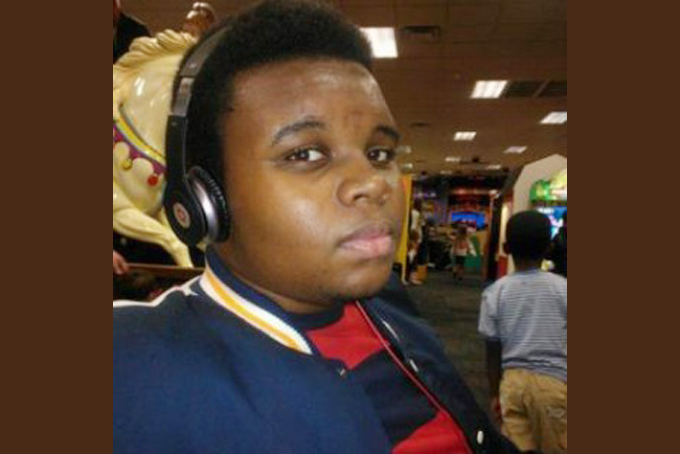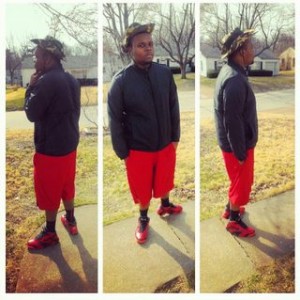
Sean Bell, unarmed, hours away from becoming a husband when he was slaughtered by police in a 50-bullet fusillade in November 2006, in Queens, N.Y.
Ariston Waiters, 19, of Union City, Ga.; unarmed, shot twice in the back and killed by a police officer in December 2011.
Ramarley Graham, an unarmed Bronx teen chased into his grandmother’s home and killed by police in the bathroom in February 2012.
Kendrec McDade, an unarmed, 19-year-old shot seven times and then handcuffed on the ground by Pasadena, Calif., police, the result of a fake 911 call in March 2012.
Trayvon Martin, Renisha McBride, Johnathan Ferrell, Eric Garner…and now, Michael Brown.
The list of names, faces, families in mourning grows longer, representing a persistent ill that has plagued the African-American community—death at the hands of police, security officers and vigilantes.
“We are not in a war. A war means that both sides pick up arms against each other,” said Raymond Winbush, director, Institute of Urban Research at Morgan State University. “[Rather,] Black people are experiencing a slow form of genocide…. There’s just, in general, this devaluing of Black life.”
In 2012, the last year for which data is available, more than 300 African Americans died at the hands of police officers, according to the FBI.
And a report by the Malcolm X Grassroots Movement estimates that in the United States one Black person dies by extrajudicial killing every 28 hours.
“They are killing us at the rate of one every 28 hours. That surpasses what was happening 100 years ago when Black people were being lynched every two days,” Winbush said.

Michael Brown’s death is one of those modern-day “lynchings,” many in the Black community believe.
On Aug. 9, shortly after noon, Michael Brown and a friend were walking near the Canfield Green Apartments when an officer pulled up beside them. What happened next is a matter of debate.
St. Louis County Chief of Police Jon Belmar, in a statement sent to the AFRO, said when the officer tried to exit his vehicle, Brown allegedly pushed the police officer back into his vehicle and tried to take his weapon, whereupon he was shot.
Eyewitnesses disagree, however, saying it was the officer who pulled Brown by his neck into the car window and shot him. The officer then exited the vehicle and, though Brown was kneeling on the ground, unarmed and with hands raised in surrender, shot him several more times.
The 18-year-old’s death drew residents onto the streets in protest, which has grown in size and ferocity in the ensuing days as protestors allegedly kicked police cars, threw bottles and looted nearby stores.
“Tensions are high and things are really tense because people are understandably angry and upset,” said Chawn Saddam Kweli, national chief of staff of the New Black Panther Party, who was on hand for the protests.
“What they are trying to term a riot is a rebellion,” he added. “They (residents) are lashing out because they feel they will not get justice in the White courts.”
Contributing to that rage, Kweli said, is the consensus that Brown was a “good boy,” who had set his eyes on a straight path. In fact, he was supposed to start college on Aug. 11, two days after his death.
“We should be celebrating my son’s going to college but we’re planning a funeral,” Brown’s mother, Lesley McSpadden, told the Rev. Al Sharpton in an interview on MSNBC.
Her father, Les McSpadden, called his grandson’s death an “execution,” which was part of an ongoing pogrom against young men of color.
“It’s a shame that these Black kids in St. Louis and, I’m sure, around the world, they might as well walk around with a target on their back,” he said.
Kweli agreed, saying Brown’s death—and the residents’ reactions—were symptomatic of persistent racial tensions in Ferguson, and several Congressional Black Caucus members sent a letter to Attorney General Eric Holder requesting that the Department of Justice launch an independent investigation in light of that history.
“There’s a high rate of profiling and targeting of African Americans in Ferguson,” Kweli said.
But the situation also encapsulates a broader problem, which is the marginalization and criminalization of Black men and women.
“We may not like to say this, but White people, particularly police, don’t see us as human; they see us as animals,” Winbush, the Morgan State professor, said.
That dehumanization begins in childhood, social experts said. In a research project published in the {Journal of Personality and Social Psychology,} UCLA professor Phillip Goff and associates examined how college students and police officers estimated the ages of children who they were told had committed crimes. In both groups, participants tended to overestimate the ages of Black children compared with non-Black ones, implying that Black children were seen as “significantly less innocent” than others.
And that skewed images of Blacks—often as thugs and gang members—is also perpetuated by the media. For example, some news outlets have reported protestors as chanting, “Kill the Police,” when really they were saying a popular refrain among Black activists, “No Justice; No Peace,” Kweli and others said. And, some news outlets have shown a photo of Brown with his fingers extended, which some have interpreted as a “gang sign,” prompting a Twitter protest. Black men and women posted side-by-side images of themselves—one depicting them as everyday, upstanding Janes and Joes, and the other as the stereotypical gangsters and thugs, accompanied by the hashtag, #IfTheyGunnedMeDown.
One way to ensure those misperceptions of Blacks do not result in more police killings is to station more Black or hometown officers in communities of color, Winbush and Kweli suggested.
White and/or non-native police officers in places like Ferguson are regarded by residents “like a foreign occupying force because they are disconnected from the people,” Kweli said.
Cedric Alexander, president of The National Association of Black Law Enforcement Executives, was less willing to blame racism or other bias for the use of lethal force against African Americans. He warned that each situation should be judged individually and urged Ferguson residents and observers to “wait until the investigation is complete before any conclusions are drawn so that we can be fair to Mr. Brown and his family and to the police.”
Alexander said there are good and bad people everywhere. “The key here is to have well-trained police and a community that makes an effort to work with the police. Police and community have a shared responsibility in moving forward from this,” he added.
Winbush questioned why African-American communities seem to be the only ones asked to restrain their reactions, especially in light of persistent injustices.
“It is funny how in the media people are questioning why Ferguson residents are reacting the way they are as if there is no reason…. It is almost like you’re supposed to sit there and take it,” he said.
But the insurrection in Ferguson is an “appropriate response and consequence” of the unjust killing of a young Black man, the professor added.
“We have to do something in retaliation so that police think twice before shooting another young Black man,” Winbush said. “It’s like the bully in the schoolyard—you have to, one day, turn around and fight or they will keep on being a bully.”
Meanwhile, President Obama sent his condolences to Brown’s family and confirmed the Department of Justice would be investigating the matter. He also, like many others, urged Ferguson residents to curb their violent reactions.
“I know the events of the past few days have prompted strong passions, but as details unfold, I urge everyone in Ferguson, Missouri, and across the country, to remember this young man through reflection and understanding,” the president said. “We should comfort each other and talk with one another in a way that heals, not in a way that wounds. Along with our prayers, that’s what Michael and his family, and our broader American community, deserve.”
– See more at: https://www.afro.com/black-men-prime-cop-targets/